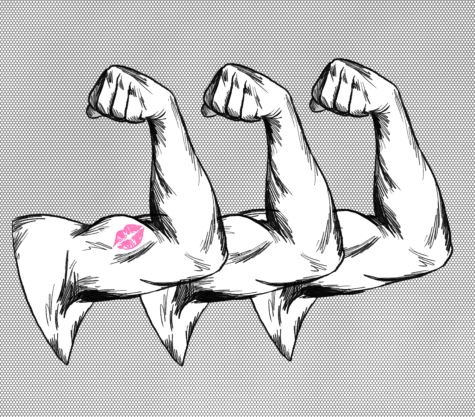Toxic masculinity and the birth of the “chill girl”
April 7, 2022

In 2019, Gillette released an ad in an attempt to, first and foremost, sell razors, but also to end toxic masculinity. Perhaps their efforts weren’t as successful as we could have hoped, however, they did do a darn good job at infuriating Republicans and getting the conversation started.
Before diving into the depths toxic masculinity, I want to first review what was wrong with the ad—it’s been a few years since it came out, so I figure we could all use a brief refresh. To sum it up, Gillette had the right idea, but they made it far too simple. Toxic masculinity is more than catcalling, more than talking over women and more than homoerotic-yet-somehow-homophobic-jokes.
Since 2019, the general public has gotten more comfortable with talking about toxic masculinity. The solid, generally agreed-upon definition of toxic masculinity refers to the aggression, dominance and lack of emotion expected of men. As the general cultural climate becomes more inclusive, we’ve learned that men have feelings too! The old standards of masculinity are becoming less prevalent, but like all norms, they’re hard to erase entirely—and just like COVID-19, there will always be new variants.
The execution of toxic masculinity varies depending on different environments, meaning, of course, it looks different at Whitman College than it does in the WSU football team’s locker room. That is not to say these long-entrenched norms don’t exist in woke liberal settings; generations upon generations of men were raised in a harmful way that can’t be erased overnight or by a two-minute ad for razors.
At Whitman, I can proudly say I don’t pick up on a lot of the classic “toxic masculinity” behaviors on a daily basis. Sure, townies catcall women walking down Isaacs all the time, but Whitman men are quick to shout back in defense—it’s not much, but the effort is appreciated.
Here, this toxicity isn’t as obvious; it’s getting mad at women that don’t want to hookup, disregarding men’s experiences with sexual assault, gendered expectations about sexual experience, using the word “female,” etc.
When toxic masculinity isn’t glaringly obvious, it’s harder for us to call out. Telling a guy to stop catcalling is much easier than calling out an overall “dominant” personality. Additionally, it seems to me that these toxic behaviors have created a trap for women on campus. All the characteristics of the ideal masculine man are pushed onto women; men don’t need tough men anymore, they want the chill girl.
Any 20-something year-old woman (or reader of “Gone Girl”) is far too familiar with the “chill girl” trope. A chill girl is laid back, doesn’t get too drunk or too high and laughs at jokes but doesn’t tell too many. It’s a little funny, the chill girl is, hopefully by accident, toxic masculinity’s dream.
The “chill girl” ends up being the perfect friend for a classic toxic man. Think about it—this is a girl that’s extremely mellow, doesn’t try to cause a scene and certainly doesn’t try to question or overpower men’s authority.
I’m sure some of us are far too familiar with this trope. A man is accused of sexual assault and yet, there is still a flock of girls claiming they’ve never experienced bad behavior from him, so, he is fine. Maybe it’s more obvious in relationships—an off the rails guy with a girl that silently allows his actions because causing a scene would be far more embarrassing.
I want to end this article very candidly—as I do not want to be misinterpreted. I don’t want readers to think I am bashing every man, but I also don’t want you to think I am excusing any sort of negative behaviors, and I am certainly not saying nothing toxic happens at Whitman.
I am also not trying to make women the problem either, however, I am firm in believing that women can play a bigger role than we’re given credit for in fixing this problem.
On a small campus like Whitman’s, we need to be careful and mindful about how our behaviors manifest in others. It is easier to dismiss the little things and not realize that they contribute to the larger culture. If toxic masculinity begs for dismissing bad behavior, there is no match better made than a toxic man and a chill girl.





